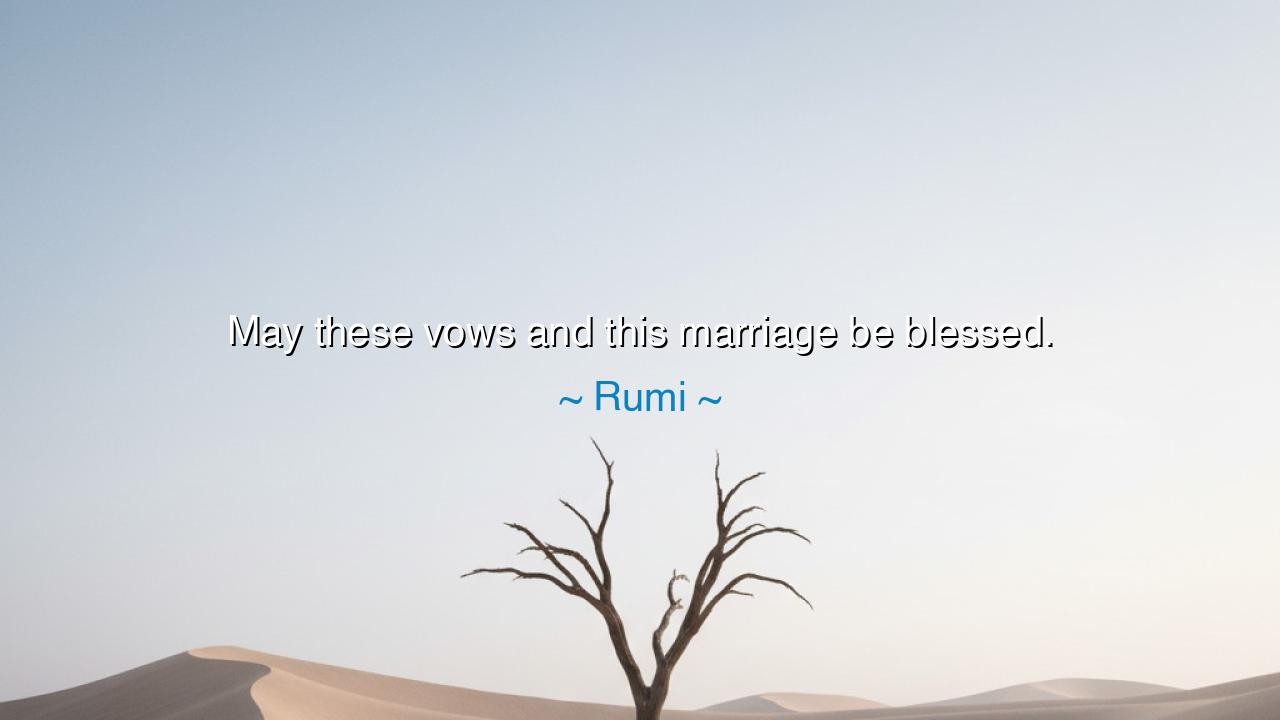
May these vows and this marriage be blessed.






In the gentle yet eternal words of Rumi, the mystic whose heart was a bridge between earth and heaven, we are given a prayer that transcends all ages: “May these vows and this marriage be blessed.” Though simple in sound, these words carry the weight of the divine. They are not merely a wish for human happiness—they are a consecration, a sanctifying breath upon the sacred union of two souls who choose to become one. For Rumi, marriage was not a social contract or a worldly convenience; it was a mirror of the soul’s longing for union with the Beloved, the divine essence that gives life to all things.
The origin of this quote lies in Rumi’s Divan-e Shams-e Tabrizi, the collection of his ecstatic poems inspired by his spiritual companion, Shams of Tabriz. In his poetry, Rumi often used the language of human love and marriage to express the union of the soul with God. To him, the bond between two lovers was not separate from the bond between creation and Creator—it was a reflection of it. Thus, when he prays that “these vows and this marriage be blessed,” he speaks not only to the bride and groom of his time, but to all who enter love with sincerity and courage. His words are both blessing and instruction, urging us to see marriage not as possession, but as partnership in the sacred journey toward divine unity.
To Rumi, a blessed marriage is one that transforms. It is the furnace where the raw elements of the self—pride, fear, and desire—are melted into humility, trust, and compassion. The vows are not empty words spoken before witnesses, but spiritual anchors cast into eternity. They bind not through force, but through love’s gravity, drawing two souls ever closer to the divine center within them both. Rumi reminds us that such a union must be nourished daily with patience, laughter, and forgiveness, for no blessing endures without tending. The blessing he invokes is not a promise of ease, but of grace—the grace to grow together through both joy and trial, becoming each other’s teacher and mirror.
History offers a beautiful reflection of Rumi’s vision in the marriage of Mahatma Gandhi and Kasturba Gandhi. Their union began in youth and endured decades of struggle, imprisonment, and sacrifice. They did not always agree; at times, their bond was tested by Gandhi’s relentless pursuit of truth and simplicity. Yet through those trials, their love was refined into something greater than affection—it became companionship in purpose, a partnership devoted to the liberation of others. Their marriage, in its endurance and humility, embodied the blessing Rumi envisioned: a union not of comfort, but of spiritual evolution. Like Rumi’s lovers, they transformed human devotion into a vessel for divine work.
Rumi also teaches that a blessed marriage is not limited to the bond between two individuals; it is a metaphor for all sacred commitments. Every true relationship—whether between lovers, friends, or souls seeking God—requires vows of honesty, faith, and compassion. When we approach others with reverence, when we see the divine spark in every heart, every encounter becomes a kind of marriage—a joining of spirits in the eternal dance of love. In this sense, his words are not just a prayer for lovers, but a call for humanity to live in harmony, to bless all our bonds with understanding and humility.
The lesson in Rumi’s prayer is clear: love is sacred work. It is not sustained by passion alone, but by the quiet daily act of blessing one another. To bless your partner is to forgive, to see them not as they are, but as they are becoming. To bless your marriage is to protect it from neglect, to feed it with gratitude, and to honor it as the place where divine love finds its reflection in human form. Rumi’s blessing is both a gift and a challenge—to rise above the self and live love as worship, to make the ordinary union of two lives into a holy covenant.
So let these words be carried forward as a prayer for every soul who seeks love and gives it: “May these vows and this marriage be blessed.” May they remind us that to love is to walk the sacred path toward God, and to marry is to build a temple not of stone, but of hearts. May those who unite in sincerity find not perfection, but transformation; not possession, but partnership; not fleeting passion, but the eternal flame of compassion. For in every blessed union, human love becomes divine, and two souls, joined in tenderness, become the living echo of eternity itself.






AAdministratorAdministrator
Welcome, honored guests. Please leave a comment, we will respond soon